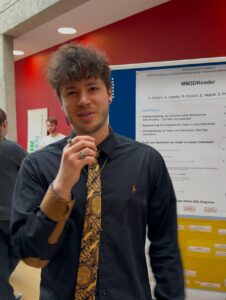This year’s Software Technology Fair (SWT Fair) took place at the IT Center on March 7. This marks the end of the “Software Engineering” module for the dual study program “Applied Mathematics and Computer Science” at FH Aachen. The prospective mathematical-technical software developers (MATSE) presented their projects and showed what they had learned over the course of the semester.
The Projects
Once again this year, the training companies and higher education institutions provided exciting topics for the MATSE trainees’ projects. Participating companies were GTS Systems and Consulting GmbH, INFORM GmbH, SOPTIM AG, Amadeus Leisure IT GmbH, Databay AG, Decadia GmbH, PSI Metals Non Ferous GmbH, IVU Traffic Technologies AG, Ericsson GmbH and the Institute for Medical Informatics at the UKA. Various institutions of RWTH Aachen University were also represented as project sponsors: the WZL (Machine Tool Laboratory), the IT Center, the Institute of Engineering Hydrology, the Institute of Transmission Technology, Machine Dynamics and Robotics as well as the Chair and Institute of Concrete and Masonry Structures.
A total of 90 MATSE trainees worked on their projects in 20 small groups. These covered a wide range of topics, from “GUI-supporteddiagnosis of an NFC/payment device on on-board units in public transport” to “Creation, visualization and inspection of construction plans in VR” and “Development and prototyping of AI-supported software for automated transcription”.
The MATSE trainees from the IT Center presented two projects: in one project the “Development of a prototype for uploading, managing and checking training certificates (AnuBis)” was developed and in another project the “Pre-course administration in RWTHmoodle”.
AnuBis
AnuBis is a training record and supervisor information system and is to become the successor to the currently used IHK tool “Tibros”, which will be shut down in August 2025.
will be switched off. The system is intended to model the relationship between trainees and supervisors and thus enable trainees to write training certificates in good time, which are checked by supervisors and collected centrally so that all certificates can be presented at the end of the training. Trainees can use an input form to write down their achievements from (high) school and their work performance or upload their achievements via PDF.
Supervisors also have the option of defining a time interval at which the training certificates should be created, for example weekly or monthly. The system can also send an automatic reminder email if no certificate has been received shortly before the deadline.
The web app uses the Vue.js framework and the Bootstrap5 styling package in the front end, while the back end is based on Django and verifies and manages the data from the front end. Celery is also used in the backend. Celery handles the communication with a worker server in order to execute reminders asynchronously and after any but fixed period of time and to make them resistant to server restarts. The backend is therefore primarily responsible for modeling the relationships and the logic. The frontend, on the other hand, is used to forward and display the information from the backend.
RWTHmoodle: Pre-course administration
The project aims to create a plug-in for RWTHmoodle. RWTHmoodle is used, among other things, for preliminary courses that RWTH Aachen University offers new students to prepare them for their studies.
Until now, the administration of pre-course participants has been decentralized among the various providers of pre-courses. The plug-in is intended to standardize the administration of these preliminary courses. A configurable registration form makes it possible to register for the preliminary course independently. In addition, the creation of an RWTHmoodle account, including checking whether the person already has an account, has been integrated into this process. After registering for a pre-course, an automatic confirmation email is sent, which can be used to set a password for the potentially newly created account.
The plug-in was created with PHP and the Moodle database in the backend and integrated into the Moodle environment. For this purpose, the Moodle database could be extended when creating the new plug-in. Docker Desktop was also used to run and test Moodle with the plug-in.
Conclusion and outlook
The Software Engineering Fair 2025 was a valuable opportunity for the prospective MATSEs to present their projects. The event encouraged the exchange of ideas and experiences and created a positive atmosphere for communicative exchange between “exhibitors” and “visitors”.
The practical projects enabled the students to develop not only their technical skills, but also important soft skills such as teamwork and communication skills. This combination of technical know-how and personal skills is crucial for their future professional success.
We congratulate the MATSE trainees on their outstanding achievements and look forward to experiencing new exciting projects next year!
Responsible for the content of this article is Marc Weerts.







Leave a Reply